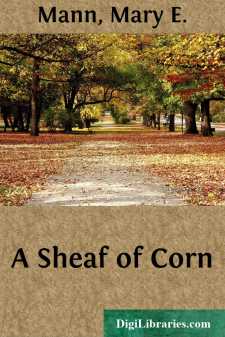Categories
- Antiques & Collectibles 13
- Architecture 36
- Art 48
- Bibles 22
- Biography & Autobiography 813
- Body, Mind & Spirit 142
- Business & Economics 28
- Children's Books 14
- Children's Fiction 11
- Computers 4
- Cooking 94
- Crafts & Hobbies 4
- Drama 346
- Education 46
- Family & Relationships 57
- Fiction 11829
- Games 19
- Gardening 17
- Health & Fitness 34
- History 1377
- House & Home 1
- Humor 147
- Juvenile Fiction 1873
- Juvenile Nonfiction 202
- Language Arts & Disciplines 88
- Law 16
- Literary Collections 686
- Literary Criticism 179
- Mathematics 13
- Medical 41
- Music 40
- Nature 179
- Non-Classifiable 1768
- Performing Arts 7
- Periodicals 1453
- Philosophy 64
- Photography 2
- Poetry 896
- Political Science 203
- Psychology 42
- Reference 154
- Religion 513
- Science 126
- Self-Help 84
- Social Science 81
- Sports & Recreation 34
- Study Aids 3
- Technology & Engineering 59
- Transportation 23
- Travel 463
- True Crime 29
A Sheaf of Corn
by: Mary E. Mann
Categories:
Description:
Excerpt
WOMEN O' DULDITCH
Dinah Brome stood in the village shop, watching, with eyes keen to detect the slightest discrepancy in the operation, the weighing of her weekly parcels of grocery.
She was a strong, wholesome-looking woman of three- or four-and-forty, with a clean, red skin, clear eyes, dark hair, crinkling crisply beneath her sober, respectable hat. All her clothes were sober and respectable, and her whole mien. No one would have guessed from it that she had not a shred of character to her back.
The knowledge of this incontrovertible fact did not influence the demeanour of the shop-woman towards her. There was not better pay in the village, nor a more constant customer than Dinah Brome. In such circumstances, Mrs Littleproud was not the woman to throw stones.
"They tell me as how Depper's wife ain't a-goin' to get over this here sickness she've got," she said, tucking in the edges of the whitey-brown paper upon the half-pound of moist sugar taken from the scales. "The doctor, he ha'n't put a name to her illness, but 'tis one as'll carry her off, he say."
"A quarter pound o' butter," Dinah unmovedly said. "The best, please. I don't fancy none o' that that ha' got the taste o' the shop in it."
"Doctor, he put his hid in at the door this afternoon," Mrs Littleproud went on; "he'd got his monkey up, the old doctor had! ''Tis a rank shame,' he say, 'there ain't none o' these here lazy women o' Dulditch with heart enough to go to help that poor critter in her necessity,' he say."
"Ler'm help her hisself," said Mrs Brome, strong in her indifference. "A couple o' boxes o' matches, Mrs Littleproud; and you can gi' me the odd ha'penny in clo' balls for the disgestion."
"You should ha' heered 'm run on! 'Where be that Dinah Brome?' he say, 'that ha' showed herself helpful in other folks' houses. Wha's she a-doin' of, that she can't do a neighbour's part here?'"
"And you telled 'm she was a-mindin' of 'er own business, I hope?" Mrs Brome suggested, in calmest unconcern.
"I'll tell you what I did say, Dinah, bor," the shop-woman said, transferring the sticky clove-balls from their bottle to her own greasy palm. "'Dinah Brome, sir,' I say, 'is the most industrousest woman in Dulditch; arly and late,' I say, 'she's at wark; and as for her floors—you might eat off of 'em.'" She screwed the half-dozen hard red balls in their bit of paper, and stowed them lightly in the customer's basket. "That the lot this week, Dinah?"
Dinah removed her basket from counter to arm. "What'd he got to say for hisself, then?" she asked.
"'A woman like that can allust make time,' the old doctor he say. 'Tell her to make time to help this here pore sufferin' woman.' I'm a-sayin' it as he said it, Dinah. I ain't a-hintin' of it myself, bor."
"Ler'm tell me, hisself, an old interfarin' old fule, and he'll ha' the rough side o' my tongue," the customer said; and nodded an unsmiling good-afternoon, and went on her way.
Her way led her past the cottage of the woman of whom they had spoken. Depper's cottage, indeed, was the first in the row of which Dinah's was the last—a half-dozen two-roomed tenements, living-room below, bedroom above, standing with their backs to the road, from which they were divided by no garden, nor even so much as a narrow path....



